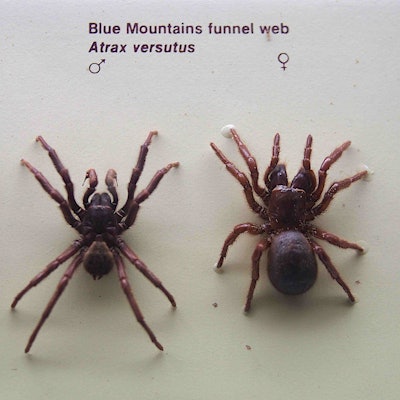 Made with spider venom, the product does not affect bees, birds, fish, mammals or beneficial insects because of the targeted nature of the peptide toxins, according to Vestaron.
Made with spider venom, the product does not affect bees, birds, fish, mammals or beneficial insects because of the targeted nature of the peptide toxins, according to Vestaron.Photo: Wikipedia
A scientist studying spider venom to discover an alternative to chemical pesticides may sound like the origin story of a comic book character, but for Glenn King, the research resulted in the origin of Vestaron, a developer of peptide-based insecticides.
While at the University of Connecticut from 1999 to 2006, King, an Australian biochemist, identified the individual chemical compounds of the Blue Mountains funnel-web spider.
According to the National Science Foundation, there are more than 100 chemical compounds found in funnel-web spider venom. Just one of these compounds is fatal to humans, and King discovered that several of them are harmless to honeybees.
“It’s an incredible, complex chemical cocktail that the funnel-web spider throws at its insect prey to disable it,” King told the Sydney Morning Herald.
After discovering this bee-friendly compound, King had to study its structure in three dimensions and how it was lethal to pests in order for a synthetic version to be produced.
It was in 2005 that King founded Vestaron Corp., which now produces the bioinsecticide Spear. According to the company website, their product does not affect bees, birds, fish, mammals or beneficial insects because of the targeted nature of the peptide toxins. These species do not have the receptors that would allow the insecticide to enter a cell.
Despite its foundation, Vestron is not filled with workers milking these creepy-crawlies for venom. Instead the company was able to create a fermentation process from one sample of real venom.
“We selected those that don’t have any mammalian effect, and we isolated those components, synthesized the genes for them, put them into yeast, and by fermentation, that produces our product for us,” Vestaron CEO John Sorenson told Michigan Radio. “It’s a slick way to have to get around milking spiders.”
The company received an industry award last year for its work in biopesticides and the EPA removed its bee toxicity warning label after reviewing the product.
Vestaron is based in Kalamazoo, Michigan, and is currently looking into the venom of other creatures for future products.









